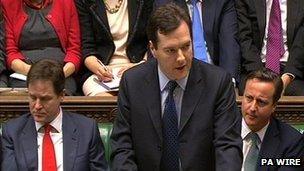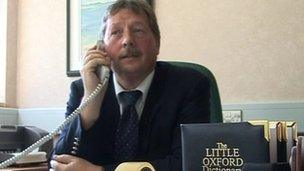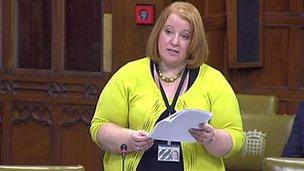Mixed NI reaction to budget plans
- Published

The chancellor said the top rate of income tax would be cut to 45p
There has been a mixed reaction in Northern Ireland to the chancellor's Budget.
Finance Minister Sammy Wilson expressed anger that there had not been more help for low income families.
The SDLP Foyle MP Mark Durkan said it was a "slap in the face to the worst off in society". Sinn Fein's Conor Murphy said there was "little relief for those on benefits and low pay".
However, NI Secretary of State Owen Paterson welcomed the Budget.
He said the measures provided "significant help" to hard working families in Northern Ireland.
"The increase in income tax personal allowances by a further £1,100 in April 2013 - the largest in 30 years - will benefit 605,000 people in Northern Ireland, and lift 25,000 out of income tax," he said.
"In addition, raising the individual threshold for the withdrawal of child benefit to £50,000 will benefit 16,000 households in Northern Ireland.
"This is also a budget for jobs and business growth, which are key objectives shared by both the UK Government and the Northern Ireland Executive."
He said the reduction in Corporation Tax to 22% by 2014 would encourage investment.
But Northern Ireland's Finance Minister expressed concern over the announcement on greater regionalisation of public sector pay.
The minister pointed out that public sector pay in Northern Ireland is already 3.5 % below the UK average.
Mr Wilson said: "The size of the public sector in Northern Ireland is similar to many other UK regions. The problem we face is that our private sector is too small.
"Therefore seeking to suppress the public sector pay here - something that is a key stimulus in local economic activity - will only impose greater differences in economic growth rates across the UK.
"I am also outraged that the chancellor has not done more to provide assistance to those on low incomes and bring families out of poverty including a reduction in fuel duty."

Sammy Wilson is concerned about public sector pay
He did, however, welcome the additional assistance for high-end television production and the confirmation of additional investment in ultra-fast broadband for Belfast.
SDLP Foyle MP Mark Durkan also expressed concern.
"The tax cut of the high rate of 50% is a very telling signal of the government's real priorities," he said.
"The justification that it will make little difference is, of course, based on the fact that many people who were liable for the tax were able to avoid it because it had been signalled in advance; therefore judging it on one year is not a valid impact measure.
"It is also the case that this also facilitates a calendar-managed avoidance.
"Moves to increase personal allowances for the lower paid are, of course, welcome, and this is something that the SDLP had argued for in the last parliament."
Alliance MP Naomi Long said there was little to be positive about in the Budget.
"I was disappointed that there was no mention of efforts to combat high fuel prices here. We have traditionally had fuel prices that were higher than other regions in the UK, with fuel laundering being a contributing factor," she said.
"The decision to reduce corporation tax to 24% now and 22% by 2014 will not affect a lot of our businesses as most pay the lower limit of 20%.

Naomi Long said there was little to be positive about in the budget
"I am disappointed that the chancellor could not commit more efforts to devolving corporation tax rates to the Northern Ireland Assembly as we face the competition of a 14% rate in the Republic of Ireland. If we are to reach that level at the current rates of the lowering of corporation tax then it would take a decade to do so."
Sinn Fein MP Conor Murphy said: "It would seem that once more with the increase in consumer taxes and spending reductions more finance will be taken out of the north's economy.
"The British Chancellor has demonstrated once more that his government takes no particular account of the impact of their financial decisions on economy of the north of Ireland.
"This Budget as with every other is fashioned to address the British government's perception of what is required to rebalance the economy of the island of Britain with no regard to its effects here."
However, Angela McGowan, chief economist at Northern Bank said it was "not a bad Budget at all".
"Low and middle income households have not borne the brunt of tax changes and although the wealthiest were also given a tax reduction from next year, this was offset by the introduction of anti tax avoidance measures and a cap on income tax relief for high earners.
"Some of the initiatives to make the UK more competitive , such as gradually lowering corporation tax and investing in broadband infrastructure, will be welcomed by the business community and in particular, Northern Ireland's extensive base of small firms will welcome the government's commitment to simplifying the tax system.
"But Northern Ireland was not singled out for any special change in corporation tax and the longer we wait for that equivalent reduction to Republic of Ireland levels, the less hopeful we get. "
Colin Neill, chief executive of Pubs of Ulster said the announcement that there will be no change to alcohol duty was, on the surface, good news for the industry.
"However, a closer look reveals that the move is nothing more than smoke and mirrors, as the Chancellor failed to mention that the beer duty escalator- originally introduced to the Budget by the previous Labour government in 2008 - will remain in place," he said.
"This news will come as no surprise to many in the industry as the government has often viewed the industry as a lucrative cash cow.
"By continuing to apply the duty escalator, the industry now, in fact, faces an increase in duty of 2% above the rate of inflation.
"This equates to an overall duty increase of 5.7% which in real terms will add approximately 10p to the price of a pint.
"Most worryingly however, this duty will now mean that publicans are in fact losing approximately 2p on a standard £3 pint of beer."
- Published21 March 2012
- Published22 March 2012
- Published22 March 2012
- Published21 March 2012
- Published23 March 2011